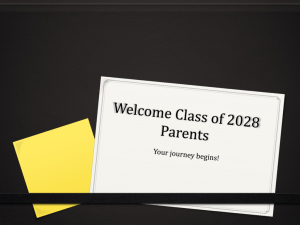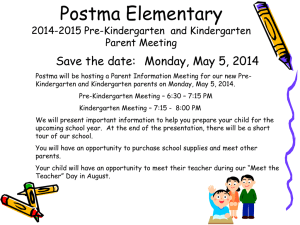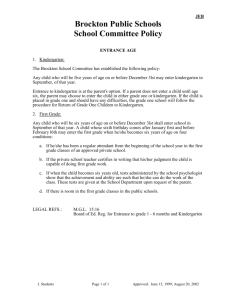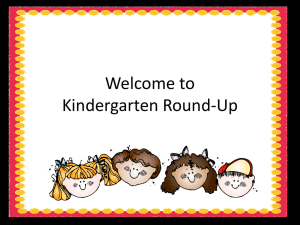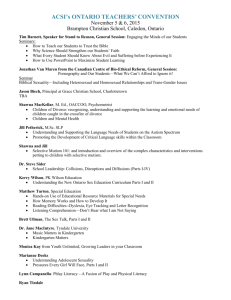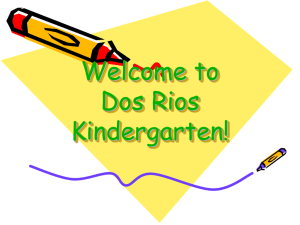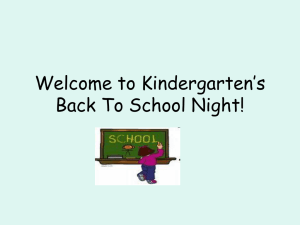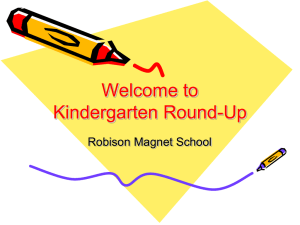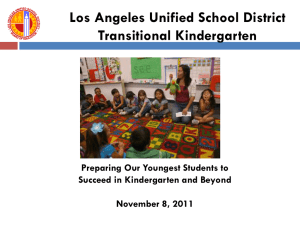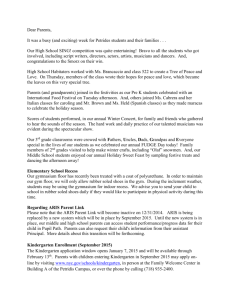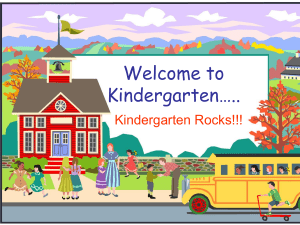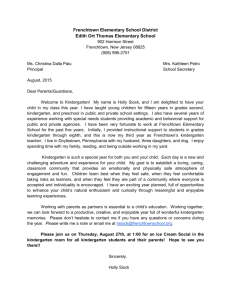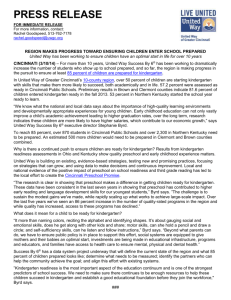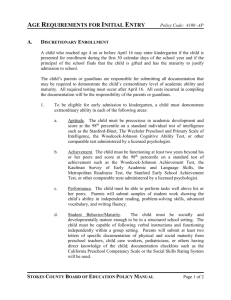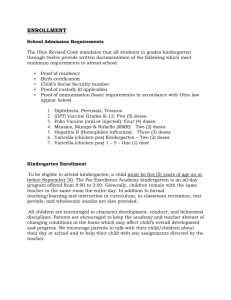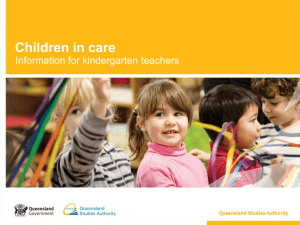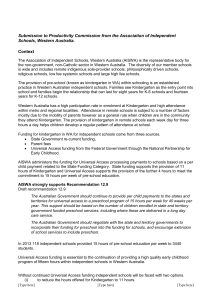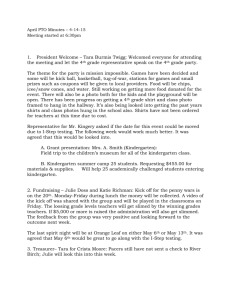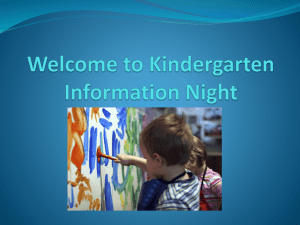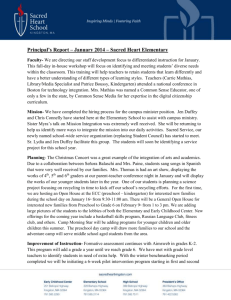Kindergarten Readiness - Temple Beth El Child Development Center
advertisement
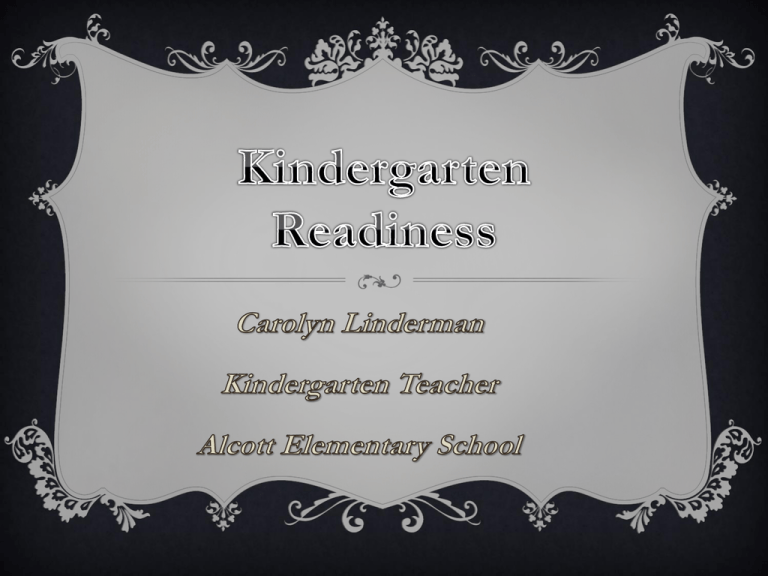
BRAVO! Your child already has a head start by being here! Only 2 out of 10 preschool-aged children actually attend a preschool program prior to Kindergarten. Teachers can tell within the first few minutes of the first day of school which students have attended preschool and which have not. Thank you for already making good choices in regards to your child’s education! H OW D O I K N OW I F M Y C H I L D I S R E A DY ? No single or simple factor determines whether a child is ready for Kindergarten. Kindergarten readiness involves four primary areas of development – Intellectual, physical, social/emotional, and self-care. Let’s take a closer look at these important developmental areas. Shows an interest in books and reading Holds a book and turns pages correctly Knows some songs, rhymes Participates in rhyming games Identifies some letters Pretends to read and write Knows first and last name Can tell about an experience Can tell and retell familiar stories Has had a variety of experiences – such as the library, park, zoo, post office, etc. Can use crayons, pencil, scissors Expresses ideas with drawings Is willing to try to complete a task INTELLECTUAL Growing brains Can run, jump, climb, swing, and use balls. Able to hold and use a pencil Can cut with scissors Paints across the mid-line Can tie their own shoes – or is learning to! Can ride a tricycle PHYSICAL Motor Skills Will listen to an adult and do as told Can cooperate with other children Can play with other children without SOCIAL/ EMOTIONAL hitting or biting Can sit for 20-30 minutes Can follow rules Understands and follows oral directions Able to share, take turns, compromise, and problem solve Desire to be independent Responsible for their personal belongings Able to separate from parents for the school day Fitting In Is independent in using the toilet Can wash their own hands Can blow nose, cover a sneeze Can snap, button, zipper or belt their own pants Can take off and put on coat/sweater Can eat unassisted. Recognizes their possessions – jacket, lunchbox, backpack, etc. Can clean up their own personal area when asked to Gets 9-10 hours of sleep each night SELF-CARE Taking care of business GEARING UP FOR K I N D E RG ART E N You are your child’s first and most important teacher! You are in a perfect position to prepare your child for kindergarten! You can help your child grow and prepare for that transition to Kindergarten! THINGS YOU CAN DO! Read to your child daily! Build their vocabulary with everyday conversation. Discuss daily routines, feelings, experiences. Listen to what they say and gently correct – Avoid using baby talk Practice managing emotions and being sensitive to others Have your child listen to and then follow 4-5 step directions Let your child play and create! Play is critical to developing your child’s imagination, creativity, critical thinking skills, and problem-solving ability. Create a routine at home to help your child get oriented to following directions Give your child developmentally appropriate chores at home and hold them accountable for doing them. These types of activities will automatically transfer over into the classroom and help your child to feel successful and comfortable. SCHOOL CUT OFF DATES Your child needs to be 5 years old before October 2, 2013. Students with birthdays falling between October 2nd and December 2nd may still enroll, but will be considered Transitional Kindergarteners Look beyond your child’s chronological age when enrolling them in Kindergarten Remember to consider all of the social, academic and developmental factors when deciding if your child is ready to enroll A C A D E M I C E X P E C TA T I O N S O F KINDERGARTEN Language Arts – by November Math – by November Consistently write their name correctly • Count at least to 20 Differentiate between numbers and letters • Recognize the numbers 1-10 Differentiate between a letter and a word • Be able to sort and classify by size, color, Recognize at least 20 of the 26 upper and objects lower case letters of the alphabet • Add and subtract to 10 Know the sounds of the consonants • Understand fewer, less, greater, more presented in class • Understand Part-Part-Whole Hear the beginning sounds in a word • Be able to use and understand Tally Marks Match words that begin with the same sound F U L L DAY K I N D E RG A R T E N W H AT A T Y P I C A L DAY L O O K S L I K E 8:40-9:10 – Roll, Calendar activities, Alphabet review, Sounds and Letters/Phonemic Awareness 9:10-9:50 – Writing 9:55-10:15 – Recess 10:15-11:20 – Mathematics 11:20-12:10 – Lunch 12:10-1:15 – Language Arts – Letters/Sounds, Rhyming, Read Aloud Stories, Comprehension, Learning Centers 1:15-1:45 – History/Science 1:45-2:00 – Recess 2:00 – 2:30 – ELD/Music/P.E. 2:30 – 2:45 – Pack-up/Clean-up/Finish-Up 2:45-2:50 - Dismissal The road ahead…….. PARENTS KNOW BEST For every parent grappling with this issue, remember……..YOU know your child better than anyone else does. YOU are their first and most important teacher. And ultimately, YOU will know what is best for your child! Temple Beth El Child Development Center offers before/after care for public Kindergarten students attending Alcott Elementary ! Contact Tanya at (951) 682-7282

